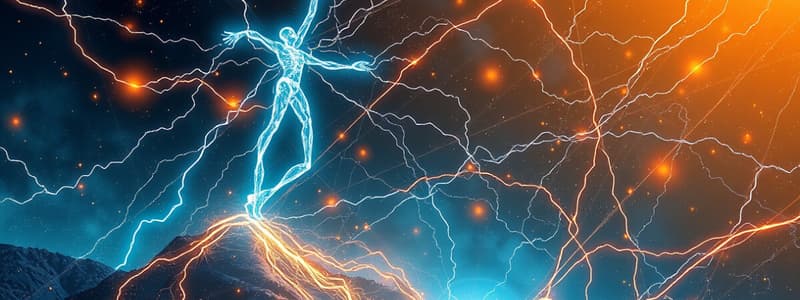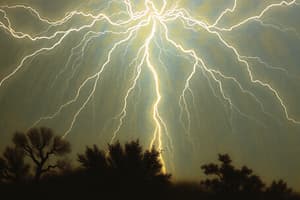Podcast
Questions and Answers
Light, heat, chemical and magnetic changes are all produced by:
Light, heat, chemical and magnetic changes are all produced by:
- force
- conductors
- a short circuit
- electricity (correct)
Most of the electricity you use daily consists of a flow of tiny, negatively charged particles called:
Most of the electricity you use daily consists of a flow of tiny, negatively charged particles called:
- neutrons
- electrons (correct)
- protons
- atoms
The movement of electricity along a path called a conductor is a(n):
The movement of electricity along a path called a conductor is a(n):
- electric current (correct)
- insulator
- conductor
- load
Materials that best transport electricity are called:
Materials that best transport electricity are called:
Which of the following materials does NOT allow a current to pass through it?
Which of the following materials does NOT allow a current to pass through it?
An ampere is a unit of electric:
An ampere is a unit of electric:
A volt is a unit of electric:
A volt is a unit of electric:
A measure of how much electrical energy is being used is known as a:
A measure of how much electrical energy is being used is known as a:
A current in which electrons move at an even rate and flow in only one direction is called:
A current in which electrons move at an even rate and flow in only one direction is called:
When a blow dryer is on and air begins to flow, you have an example of a(n):
When a blow dryer is on and air begins to flow, you have an example of a(n):
When too many appliances are put on one circuit and operated all at the same time, this is known as:
When too many appliances are put on one circuit and operated all at the same time, this is known as:
Fires in electrical circuits can occur if:
Fires in electrical circuits can occur if:
Dropping an electrical appliance into water, making it a foreign conductor, causes a(n):
Dropping an electrical appliance into water, making it a foreign conductor, causes a(n):
Which of the following devices breaks the flow of current when an overload occurs?
Which of the following devices breaks the flow of current when an overload occurs?
Which of the following should NOT be done if a fire results from an overload of an electric circuit?
Which of the following should NOT be done if a fire results from an overload of an electric circuit?
Flashcards are hidden until you start studying
Study Notes
Electricity Basics
- Light, heat, chemical and magnetic changes are produced by electricity.
- Electricity consists of a flow of negatively charged particles known as electrons.
Current and Conductors
- Electric current refers to the movement of electricity along a conductor.
- Conductors are materials that effectively transport electricity.
- Insulators do not allow current to pass through, such as alcohol.
Units of Measurement
- An ampere measures electric strength.
- A volt measures electric pressure.
- A watt measures electrical energy consumption.
Types of Current
- Direct current (DC) has electrons moving at a constant rate in one direction.
- A closed circuit permits the flow of electricity, whereas an open circuit does not.
Circuit Safety
- Overloading occurs when too many appliances are on a single circuit, leading to excess current flow.
- Electrical fires can happen due to an overloaded circuit and multiple appliances sharing the same socket.
- Dropping an appliance in water causes a short circuit by creating a foreign conductor.
Circuit Breakers
- A circuit breaker interrupts the flow of current during overload situations, enhancing safety.
- It's crucial to avoid using water to extinguish electrical fires; instead, use a fire extinguisher or smother it.
Additional Safety Considerations
- Opening a circuit intentionally can prevent appliance damage, but it shouldn't be done during a fire caused by overload.
Studying That Suits You
Use AI to generate personalized quizzes and flashcards to suit your learning preferences.




